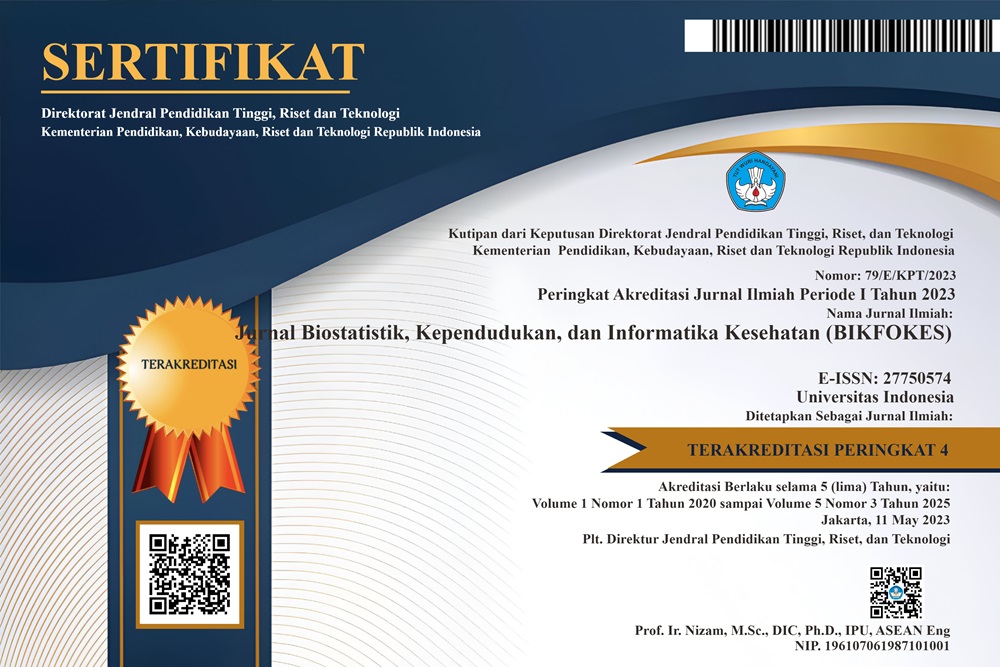Abstract
The purpose of this study is to uncover the socioeconomic and demographic factors that influence the usage of contraceptives by analysing trends and patterns in Tanzania's family planning uptake using data from national surveys. The results show that while Tanzania has made progress in increasing contraceptive prevalence from 27% in 2010 to 39% in 2021-22, disparities persist across socioeconomic and demographic lines. Women in urban areas, from higher wealth quintiles, and with higher educational attainment have significantly higher contraceptive prevalence rates compared to their counterparts. The study also reveals that the majority of women are aware of family planning methods, and more than 75% of users get their methods from public sources. However, barriers such as sociocultural norms, spousal communication, and limited knowledge continue to hinder progress, particularly in rural areas. The study's findings offer evidence-based insights to guide the development and implementation of more successful family planning policies and programs in Tanzania, with the aim of resolving ongoing disparities in access and use of family planning services.
References
Alidou, S., Dahourou, L. D., Dah, T. T. E., Sogo, A., Kenao, T. S., Yehadji, D., Meda, N., & Ekouevi, D. K. (2023). Unmet needs for modern contraceptive methods among sexually active adolescents and young women in Togo: a nationwide cross-sectional study. Frontiers in Public Health, 11(July). https://doi.org/10.3389/fpubh.2023.1169180
Basu, S., Andrews, J., Kishore, S., Panjabi, R., & Stuckler, D. (2012). Comparative performance of private and public healthcare systems in low- and middle-income countries: A systematic review. PLoS Medicine, 9(6), 19. https://doi.org/10.1371/journal.pmed.1001244
Dioubaté, N., Manet, H., Bangoura, C., Sidibé, S., Kouyaté, M., Kolie, D., Ayadi, A. M. E., & Delamou, A. (2021). Barriers to Contraceptive Use Among Urban Adolescents and Youth in Conakry, in 2019, Guinea. Frontiers in Global Women’s Health, 2(July), 1–11. https://doi.org/10.3389/fgwh.2021.655929
Handebo, S. (2021). Informed Choice of Contraceptive Methods among Women in Ethiopia: Further Analysis of the 2016 Ethiopian Demographic Health Survey. Open Access Journal of Contraception, Volume 12, 83–91. https://doi.org/10.2147/oajc.s292923
Jindal, M., Chaiyachati, K. H., Fung, V., Manson, S. M., & Mortensen, K. (2023). Eliminating health care inequities through strengthening access to care. Health Services Research, 58(S3), 300–310. https://doi.org/10.1111/1475-6773.14202
MacHange, M. D., & Munyogwa, M. J. (2022). To assess the determinants of family planning uptake among women of reproductive age in rural settings, Morogoro Region, Tanzania. Protocol for a cross-sectional study. PLoS ONE, 17(4 April), 1–8. https://doi.org/10.1371/journal.pone.0267020
Massenga, J., Noronha, R., Awadhi, B., Bishanga, D., Safari, O., Njonge, L., Kim, Y. M., Roosmalen, J. van, & Akker, T. van den. (2021). Family planning uptake in kagera and mara regions in tanzania: A cross-sectional community survey. International Journal of Environmental Research and Public Health, 18(4), 1–16. https://doi.org/10.3390/ijerph18041651
Namuhani, N., Wanyenze, R. K., Kiwanuka, S. N., Matovu, J. K. B., & Makumbi, F. E. (2024). Equity in family planning policies and programs in Uganda: conceptualization, dimensions and implementation constraints. International Journal for Equity in Health, 23(1), 1–13. https://doi.org/10.1186/s12939-024-02143-1
Ochen, A. M., & Primus, C. C. (2023). Family planning uptake and its associated factors among women of reproductive age in Uganda: An insight from the Uganda Demographic and Health Survey 2016. PLOS Global Public Health, 3(12), e0001102. https://doi.org/10.1371/journal.pgph.0001102
Pallangyo, E. S., Msoka, A. C., Brownie, S., & Holroyd, E. (2020). Religious beliefs, social pressure, and stigma: Rural women’s perceptions and beliefs about vasectomy in Pwani, Tanzania. PLoS ONE, 15(3). https://doi.org/10.1371/journal.pone.0230045
Patierno, K., & Morgan, G. (2012). Using mobile technology to improve family planning and health programs. Meeting report. Popline.Org, 1–28. http://www.popline.org/node/564125
TDHS. (2022). Demographic and Health Survey and Malaria Indicator Survey. Paper Knowledge . Toward a Media History of Documents, 1–23.
UNFPA. (2023). UNFPA Tanzania | Access to contraceptive information is central to achieving gender equality. https://tanzania.unfpa.org/en/news/access-contraceptive-information-central-achieving-gender-equality
Recommended Citation
Ayoub, Harun Yussuf and Prasetyo, Sabarinah
(2024)
"Trends in Family Planning Uptake in Tanzania: An Analysis of National Survey Data 2021-2022,"
Jurnal Biostatistik, Kependudukan, dan Informatika Kesehatan: Vol. 5:
No.
1, Article 1.
DOI: 10.7454/bikfokes.v5i1.1006
Available at:
https://scholarhub.ui.ac.id/bikfokes/vol5/iss1/1


